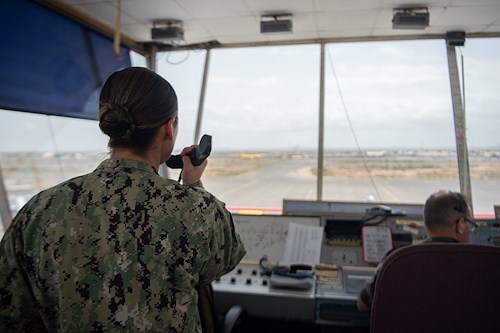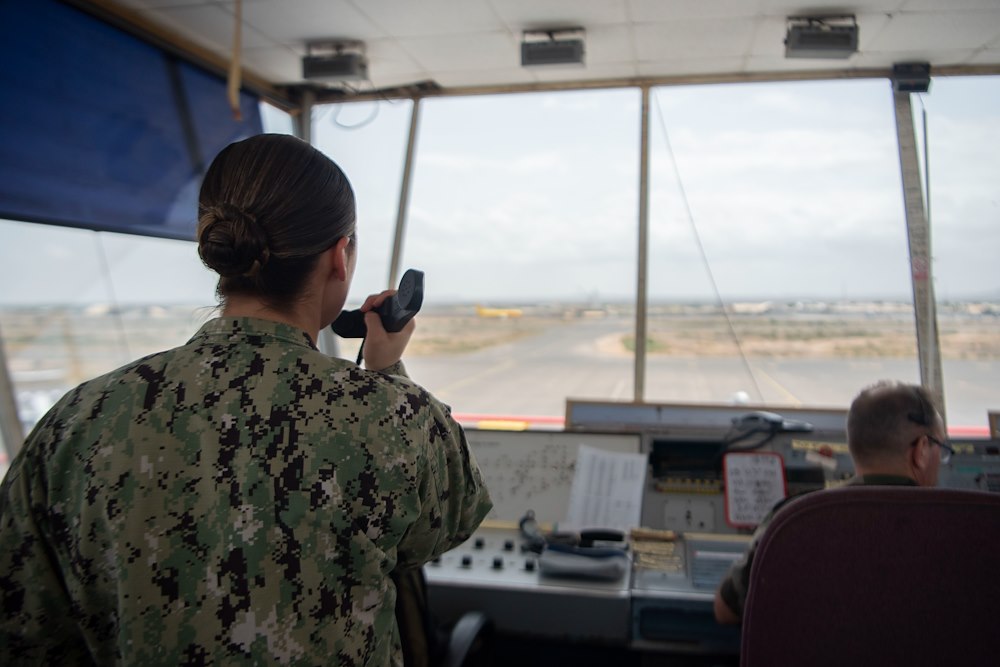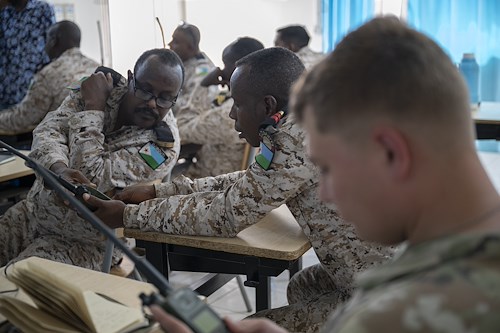Gallery contains 7 images
×
Photo 1 of 7
Air Traffic Control: Stoplight for the Sky
U.S. Navy Air Traffic Controller 1st Class Kristy Lescrynski, Combined Joint Task Force-Horn of Africa (CJTF-HOA), air traffic control training chief, left, directs an aircraft into takeoff position at Djibouti-Ambouli International Airport, March 17, 2020. Prior to the implementation of U.S. Centers for Disease Control and Prevention safety guidelines, Lescrynski worked in Ambouli’s tower to coordinate with host nation and coalition partners to ensure smooth air and ground operations at the airport. Since social distancing was implemented, U.S. controllers work out of a watch tower elsewhere on the flight line and maintain contact with Ambouli using alternate communication methods. (U.S. Air Force photo by Senior Airman Gage Daniel)
Photo by: Senior Airman Gage Daniel
Photo 2 of 7
Air Traffic Control: Stoplight for the Sky
U.S. Navy Air Traffic Controller 1st Class Kristy Lescrynski, Combined Joint Task Force-Horn of Africa (CJTF-HOA), air traffic control training chief, stands with her radio at Djibouti-Ambouli International Airport, March 17, 2020. Prior to the implementation of U.S. Centers for Disease Control and Prevention safety guidelines, Lescrynski worked in Ambouli’s tower to coordinate with host nation and coalition partners to ensure smooth air and ground operations at the airport. Since social distancing was implemented, U.S. controllers work out of a watch tower elsewhere on the flight line and maintain contact with Ambouli using alternate communication methods. (U.S. Air Force photo by Senior Airman Gage Daniel)
Photo by: Senior Airman Gage Daniel
Photo 3 of 7
Air Traffic Control: Stoplight for the Sky
U.S. Navy Air Traffic Controller 1st Class Kristy Lescrynski, Combined Joint Task Force-Horn of Africa (CJTF-HOA), air traffic control training chief, configures her radio at Djibouti-Ambouli International Airport, March 17, 2020. Prior to the implementation of U.S. Centers for Disease Control and Prevention safety guidelines, Lescrynski worked in Ambouli’s tower to coordinate with host nation and coalition partners to ensure smooth air and ground operations at the airport. Since social distancing was implemented, U.S. controllers work out of a watch tower elsewhere on the flight line and maintain contact with Ambouli using alternate communication methods. (U.S. Air Force photo by Senior Airman Gage Daniel)
Photo by: Senior Airman Gage Daniel
Photo 4 of 7
Air Traffic Control: Stoplight for the Sky
U.S. Navy Air Traffic Controller 1st Class Kristy Lescrynski, Combined Joint Task Force-Horn of Africa (CJTF-HOA), air traffic control training chief, stands in front of the Djibouti-Ambouli International Airport (JIB) control tower, March 17, 2020. Prior to the implementation of U.S. Centers for Disease Control and Prevention safety guidelines, Lescrynski worked in Ambouli’s tower to coordinate with host nation and coalition partners to ensure smooth air and ground operations at the airport. Since social distancing was implemented, U.S. controllers work out of a watch tower elsewhere on the flight line and maintain contact with Ambouli using alternate communication methods. (U.S. Air Force photo by Senior Airman Gage Daniel)
Photo by: Senior Airman Gage Daniel
Photo 5 of 7
Air Traffic Control: Stoplight for the Sky
U.S. Navy Air Traffic Controller 1st Class Kristy Lescrynski, Combined Joint Task Force-Horn of Africa (CJTF-HOA), air traffic control training chief, left, monitors an aircraft as it taxis down the flight line at Djibouti-Ambouli International Airport, March 17, 2020. Prior to the implementation of U.S. Centers for Disease Control and Prevention safety guidelines, Lescrynski worked in Ambouli’s tower to coordinate with host nation and coalition partners to ensure smooth air and ground operations at the airport. Since social distancing was implemented, U.S. controllers work out of a watch tower elsewhere on the flight line and maintain contact with Ambouli using alternate communication methods. (U.S. Air Force photo by Senior Airman Gage Daniel)
Photo by: Senior Airman Gage Daniel
Photo 6 of 7
Air Traffic Control: Stoplight for the Sky
U.S. Navy Air Traffic Controller 1st Class Kristy Lescrynski, Combined Joint Task Force-Horn of Africa (CJTF-HOA), air traffic control training chief, right, works with a Djiboutian air traffic controller to determine the best approach path for an incoming aircraft at Djibouti-Ambouli International Airport, March 17, 2020. Prior to the implementation of U.S. Centers for Disease Control and Prevention safety guidelines, Lescrynski worked in Ambouli’s tower to coordinate with host nation and coalition partners to ensure smooth air and ground operations at the airport. Since social distancing was implemented, U.S. controllers work out of a watch tower elsewhere on the flight line and maintain contact with Ambouli using alternate communication methods. (U.S. Air Force photo by Senior Airman Gage Daniel)
Photo by: Senior Airman Gage Daniel
Photo 7 of 7
Air Traffic Control: Stoplight for the Sky
U.S. Navy Air Traffic Controller 1st Class Kristy Lescrynski, Combined Joint Task Force-Horn of Africa (CJTF-HOA), air traffic control training chief, radios ground control while observing the flight line at Djibouti-Ambouli International Airport, March 17, 2020. Prior to the implementation of U.S. Centers for Disease Control and Prevention safety guidelines, Lescrynski worked in Ambouli’s tower to coordinate with host nation and coalition partners to ensure smooth air and ground operations at the airport. Since social distancing was implemented, U.S. controllers work out of a watch tower elsewhere on the flight line and maintain contact with Ambouli using alternate communication methods. (U.S. Air Force photo by Senior Airman Gage Daniel)
Photo by: Senior Airman Gage Daniel
CAMP LEMONNIER, DJIBOUTI— Air Traffic Control is an around-the-clock job, and those in the career field need to maintain flexibility to continue the mission, no matter what’s going on in the rest of the world.
For U.S. Navy Air Traffic Controller 1st Class Kristy Lescrynski, Combined Joint Task Force-Horn of Africa air traffic control training chief, and her teammates, the COVID-19 pandemic has forced changes in the way business is completed. But even so, she and her team maintain responsibility for controlling U.S. aircraft vital to CJTF-HOA’s mission as they complete their sorties from Djibouti-Ambouli International Airport.
“When it comes to how we control in the tower, it has completely changed,” said Lescrynski, who is deployed from the USS George H.W. Bush (CVN 77). “We are no longer operating out of the international tower, but we are still coordinating with aircraft and vehicles. Now, we coordinate with Djiboutian tower controllers from a watch tower elsewhere on the flight line.
“It is definitely a challenge for the watch-standers, but they are all taking it as it comes and doing what they need to do to accomplish the mission. This is a learning process for me and a bit of a curveball, but I am extremely grateful to have this opportunity to lead my Sailors through this difficult time.”
Prior to the implementation of the U.S. Centers for Disease Control safety guidelines, Lescrynski worked side-by-side with all the nations who utilize Ambouli’s runway, and occasionally found herself assisting her international colleagues.
“Before all the social safety measures began, I worked in the control tower as a liaison to the U.S. aircraft that need to move around on the shared flight line,” Lescrynski said. “Sometimes, when we were busy, I would assist other flights get to or from their destinations as necessity called for, but generally I dealt with our aircraft.”
While working in the tower, she monitored ground vehicles as they moved people, fuel, ammunition and other supplies that also needed to make their way around the flight line. All of these moving parts from several different nations could create regulatory and logistical challenges though, Lescrynski explained.
“Coordinating all of our movement alongside flights and traffic from the other nations and militaries, all while taking their regulations into consideration, wasn’t easy,” Lescrynski said. “We worked together and made it happen, and it’s comforting knowing they all share the same value for safety as we do.”
One of the other main stressors here is due to the language barrier, said Alex Granderson III, CJTF-HOA, tower branch chief. While English is the official language that’s supposed to be used between pilots and the ATC, he said, that doesn’t always mean both parties are able to completely understand one another.
“It was stressful because of the language barriers we deal with daily, with foreign airfield vehicle operators and controllers,” Granderson said. “Lescrynski overcame it through patience, understanding, and versatility, which are key attributes she has mastered through years of repetition as an Air Traffic Controller.”
Lescrynski said that, over time, she has been able to pick up on specific words or lingo pilots from other nations use, and it’s made her job easier. Spending time with air traffic controllers from other nations has also expanded her cultural understanding of CJTF-HOA’s partner nations.
“I love being able to learn about everyone’s culture while I’m on duty in the tower,” Lescrynski said. “We have varying beliefs, social norms, economies, etc., but it allowed all of us to share our cultures and better understand one another and why we are the way we are. Most importantly, it allowed us to realize that, though we come from different places and have different cultures, we’re all alike and share common goals. I wouldn’t trade this job for anything.”


























